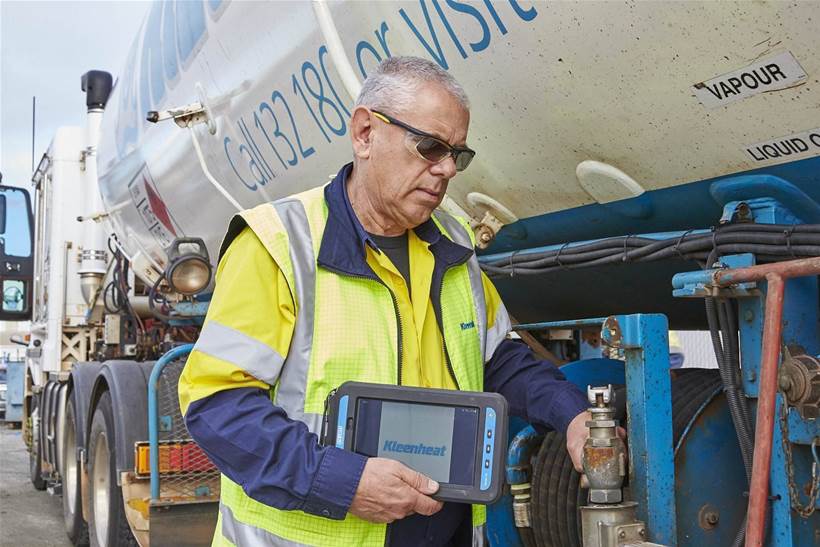LPG freight company Kleenheat has implemented a new IoT system that streams volume delivery data from flow meters to an Android app, offering numerous functions to help drivers.
The Wesfarmers subsidiary operates fleets of trucks and road tankers that deliver LPG in Western Australia and the Northern Territory.
The new system comprises an Android tablet, the Kleenheat app, backend database, in-cab server and flow meter. The flow meter is hard-wired to the server, which communicates with the tablet via Wi-Fi.
The app guides drivers through ‘fit to drive’ declarations before starting a trip. It enables them to print physical dangerous goods certificates using in-cab printers, send vehicle maintenance and cargo monitoring reports back to central offices and receive updated delivery instructions.
Kleenheat’s Larry Nick, who led the project, told IoT Hub: “The innovation for us is that we now have a far more intuitive app. The drivers find it much easier to use. We can train a driver in five minutes as opposed to four hours.
“Also, we now have software running on a generic Android tablet that gives us the flexibility to add other functions for the drivers.”
Kleenheat worked with WA-based experience design studio Hatchd to develop the new system, which replaces a basic system that used the now defunct 2G mobile network.
Hatchd director Marc Loveridge said a collaborative process to design the app, and particularly the user-interface, had been key to the success of the project.
He said Hatchd had worked with Kleenheat to refresh and streamline the Kleenheat technology with the users front of mind.
“Together with Kleenheat, we assembled a large group of internal management and IT teams, Kleenheat vehicle drivers and schedulers, as well as Hatchd user experience specialists.”
“These stakeholders then took part in a collaborative experience design process which combined the insights from all users to create a solution for everyone.”
Kleenheat’s manager, operations, Guy Bowden, added: “Our in-depth service design workshop helped gather a broad range of insights and challenges from different parts of the business. We were able capture first-hand reports of how staff interacted with the previous technology, what people liked and didn’t like about it, and most importantly, map out the future-state user journey.
“We were thoroughly impressed with how quickly Hatchd understood what our drivers and back-office needed and the emphasis they placed on user experience.”
Kleenheat operates of fleet of 25 tankers delivering bulk LPG and has around 40 trucks delivering bottled gas. Nick said the company was now working with Hatchd to develop a similar system for its bottled gas delivery, possibly tracking the cylinders via bar codes.
“There are some challenges around that. There is a lot of use we could get out of bar codes on cylinders, and we deliver gas cylinders in cages also. We just have not got there yet.”







